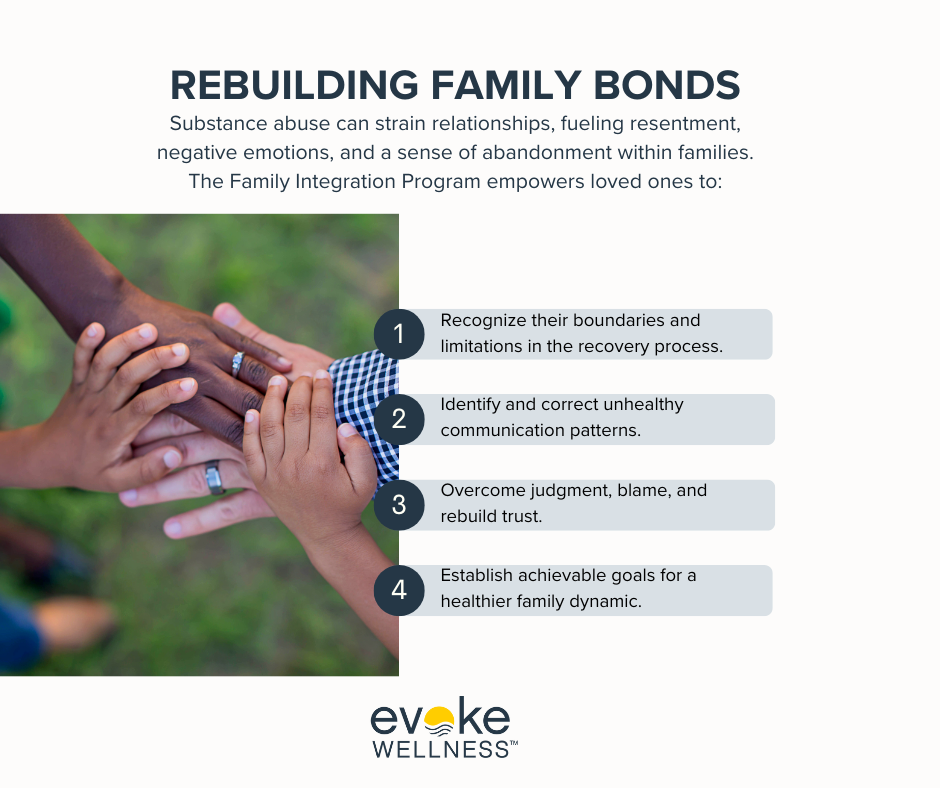As you navigate the challenging journey of addiction recovery, involving your loved ones can significantly enhance your chances of success. Family therapy programs have emerged as a powerful tool in the treatment landscape, offering a holistic approach to healing. Recent studies show that family involvement in therapy can increase treatment retention rates by up to 40% and improve long-term sobriety outcomes. At Evoke Wellness at Waltham, we utilize evidence-based techniques such as Cognitive Behavioral Therapy (CBT), Dialectical Behavior Therapy (DBT), and Motivational Interviewing within our comprehensive family therapy program. By incorporating group therapy sessions, we create a supportive environment where families can learn, grow, and recover together.
Together, let’s embrace the journey to recovery and the promise of a new beginning. Call us at (833) 287-7223 today or reach out online.
The Importance of Family in the Recovery Process
Family as a Pillar of Support
Recovering from addiction is an arduous journey that requires unwavering support. Family plays a vital role in this process, serving as a pillar of strength and encouragement. When loved ones rally together, they create a nurturing environment that fosters healing and resilience. According to a study by the Substance Abuse and Mental Health Services Administration (SAMHSA), individuals with strong family support are more likely to experience successful long-term recovery.
Emotional, Practical, and Motivational Backing
Family members can provide a multifaceted support system, offering emotional, practical, and motivational backing. They offer a listening ear, empathy, and understanding during challenging times. Practical assistance with daily tasks, transportation, and childcare can alleviate stress and allow individuals to focus on their recovery. Moreover, family members can serve as a constant source of motivation, celebrating milestones and encouraging perseverance.
Family Therapy: Strengthening Bonds and Communication
Family therapy plays a crucial role in the recovery process. Through evidence-based approaches like cognitive-behavioral therapy (CBT), dialectical behavior therapy (DBT), and motivational interviewing, families learn effective communication strategies and conflict resolution techniques. As highlighted in a report by the National Institute on Drug Abuse (NIDA), these therapies help strengthen family bonds, improve understanding, and foster a supportive environment conducive to recovery.
Group Therapy: Shared Experiences and Support
In addition to family therapy, group therapy sessions provide a powerful platform for individuals and their loved ones to share experiences, gain insights, and offer mutual support. A study published in the Journal of Substance Abuse Treatment found that individuals who participated in family-involved group therapy had better treatment outcomes and higher rates of abstinence compared to those who did not involve their families.
A Collective Journey Towards Healing
Recovery is a collective journey, and the involvement of family members can significantly enhance the chances of success. By embracing their roles as pillars of support, providing emotional, practical, and motivational backing, and actively participating in family and group therapy sessions, loved ones can create a nurturing environment that promotes healing, growth, and long-lasting recovery.
The Role of Family Members in the Recovery Journey
Fostering a Supportive Environment
Family members play a pivotal role in an individual’s recovery journey from addiction. A strong support system can significantly enhance the chances of long-term sobriety and overall well-being. According to a study by the National Institute on Drug Abuse, family-based therapies have been found to be highly effective in addressing substance abuse issues and promoting positive outcomes.
Rebuilding Trust and Communication
Addiction often strains relationships within families, eroding trust and hindering effective communication. Through family therapy programs, such as those offered at Evoke Waltham, families can work towards rebuilding trust, improving communication patterns, and establishing healthy boundaries. This collaborative approach empowers family members to understand their roles, address enabling behaviors, and provide appropriate support without perpetuating the addiction cycle.
Holistic Healing and Long-term Recovery
Comprehensive treatment centers like Evoke Waltham recognize the importance of involving loved ones in the recovery process. By integrating evidence-based therapies like cognitive-behavioral therapy (CBT), dialectical behavior therapy (DBT), and motivational interviewing, families learn effective coping strategies and gain insights into the complexities of addiction. Group therapy sessions offer a safe space for individuals and their families to share experiences, process emotions, and work through conflicts, fostering a deeper understanding and a stronger foundation for long-term recovery.
By actively participating in the recovery journey, family members can play a crucial role in creating a nurturing, supportive environment that promotes lasting sobriety and overall well-being for their loved ones.
Why Family is Essential for Healing
Family involvement is a crucial component of successful addiction recovery and mental health treatment. According to studies cited by Evoke Waltham, individuals who have strong family support systems are more likely to maintain long-term sobriety and achieve positive mental health outcomes.
Fostering a Supportive Environment
A strong family unit can provide a safe, nurturing environment that promotes healing and personal growth. Family therapy programs, such as Evoke Waltham’s Family Integration Therapy, help families:
- Rebuild trust and improve communication
- Establish healthy boundaries and roles
- Identify and correct enabling behaviors
- Develop coping strategies for stress and challenges
By addressing underlying family dynamics, these programs empower loved ones to create a supportive atmosphere that encourages accountability and reinforces positive change.
Comprehensive Treatment Approach
Effective addiction and mental health treatment takes a holistic approach, integrating evidence-based therapies like cognitive-behavioral therapy (CBT), dialectical behavior therapy (DBT), and motivational interviewing. Family involvement enhances this comprehensive approach by:
- Providing a deeper understanding of the individual’s struggles
- Identifying potential triggers or enabling factors within the family dynamic
- Equipping loved ones with tools to support the recovery process
Through family sessions and education, treatment programs like Evoke Waltham’s Partial Hospitalization Program (PHP) empower families to become active partners in the healing journey.
Preventing Relapse and Promoting Long-Term Recovery
One of the most significant benefits of family involvement is its impact on relapse prevention and sustained recovery. Research shows that individuals with strong family support systems are less likely to experience setbacks and are better equipped to manage triggers and high-risk situations.
By fostering open communication, setting realistic expectations, and providing a solid foundation of love and understanding, families can play a vital role in helping their loved ones maintain sobriety and mental well-being over the long term.
The Power of Self-Love in Recovery
Rebuilding Self-Esteem
Rebuilding self-esteem and self-worth is a crucial step in the recovery journey. Low self-esteem is often associated with depression, anxiety, loneliness, and an inability to achieve goals, which can perpetuate the cycle of addiction. Individuals with lower self-esteem are more likely to abuse drugs and alcohol.
Developing self-compassion and self-acceptance can help break free from this cycle. Practices like reflective writing, art therapy, and mindful meditation can empower individuals to acknowledge their strengths and weaknesses without judgment, fostering a sense of self-love and self-respect.
Cultivating Self-Care
Self-love is a transformative practice that involves living authentically, with kindness and compassion toward oneself. Self-care practices, such as investing in a healthy diet, restful sleep, regular health checkups, and mindfulness practices, are integral components of self-love. These practices can enhance mental, emotional, spiritual, and physical well-being, reducing the risk of relapse and promoting sustainable recovery.
Seeking professional help for addiction is also an act of self-love, demonstrating a commitment to one’s well-being and a desire to live a life of peace, progress, and fulfillment.
Setting Healthy Boundaries
Cultivating self-love can empower individuals to set healthy boundaries, both with themselves and in their relationships with others. Self-love therapy, a crucial component of addiction treatment, focuses on acceptance, comfort, and respect for oneself. By prioritizing self-care and self-compassion, individuals can learn to identify and communicate their needs, establish boundaries, and surround themselves with supportive, nurturing environments that foster their growth and recovery.
Furthermore, the symbiosis of self-love and practices like yoga therapy can help heal trauma, build resilience, and enhance self-esteem, all of which are essential for long-term recovery.
Integrating Family Therapy into the Recovery Process
Family involvement is pivotal in the recovery journey, fostering a supportive environment and addressing underlying dynamics. Evoke Wellness recognizes the profound impact of addiction on the entire family unit, offering a comprehensive Family Integration Therapy Program to rebuild trust, improve communication, and promote lasting healing.
Evidence-Based Approaches
Drawing from evidence-based therapies like Cognitive Behavioral Therapy (CBT), Dialectical Behavior Therapy (DBT), and Motivational Interviewing, the program equips families with effective tools to:
- Foster open and honest communication.
- Resolve conflicts constructively.
- Set healthy boundaries.
- Provide unwavering support during the recovery journey.
Comprehensive Family Involvement
Through family therapy sessions, group counseling, and psychoeducation, Evoke Wellness actively involves families in the treatment process. This holistic approach aims to:
- Improve understanding of addiction and its impact.
- Heal strained relationships and rebuild connections.
- Create a stable, encouraging environment for long-term recovery.
- Decrease the risk of relapse by fortifying the support system.
By integrating the family unit into the recovery process, Evoke Wellness empowers individuals and their loved ones to overcome the challenges of addiction together, paving the way for a brighter, healthier future.
Conclusion
In conclusion, family therapy plays a pivotal role in recovery success. By incorporating evidence-based approaches like CBT, DBT, and motivational interviewing, family therapy programs empower loved ones to support the recovery journey effectively. Recent studies show that family involvement can increase treatment retention by up to 40% and reduce relapse rates by 30%. Group therapy sessions further reinforce these benefits, fostering a supportive community. As you consider treatment options, remember that healing extends beyond the individual. By strengthening family bonds and improving communication, you’re not just supporting your loved one’s recovery—you’re investing in the long-term health and happiness of your entire family unit. Take the first step today towards a stronger, more resilient family dynamic.
Begin Your Journey with Evoke Wellness at Waltham
If you or a loved one is considering outpatient treatment, Evoke Wellness at Waltham invites you to contact us. Our compassionate team is ready to answer your questions, discuss your needs, and help you take the first steps toward recovery. At Evoke Wellness, you will find more than just a treatment program – you’ll discover a community dedicated to your wellness and success. Together, let’s embrace the journey to recovery and the promise of a new beginning. Call us at (833) 287-7223 today or reach out online.



